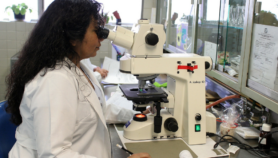By: Stephanie Achieng’ and Sam Otieno
Send to a friend
The details you provide on this page will not be used to send unsolicited email, and will not be sold to a 3rd party. See privacy policy.
[NAIROBI] Innovators need to work closely with farmers to create data and technologies that will boost sustainable agricultural growth in the global South, nutrition and data experts say.
The experts noted during the Ministerial Conference on Agriculture and Nutrition Data and 4th Agritec Africa International Exhibition in Kenya last month (14-16 June) that agricultural technologies could spur economic growth in the global South to benefit the people through rapid job creation, improved food security, nutrition and health.
“There is a need for a shift in new service delivery to producers through a new technological knowledge.”
Dhairya Pujara, Ycenter
The meeting that was organised by Global Open Data for Agriculture and Nutrition discussed how to effect positive changes in agriculture in the global South.
Dhairya Pujara, founder of US-based Ycenter, an organisation that aims to redesign educational approaches to solve development challenges, says that agricultural productivity has become a challenge due to lack of technological innovations that could enable more people to participate in the agricultural sector, and make aging farmers spend few hours on their farms.
“There is need for a shift in new service delivery to producers through a new technological knowledge and working closely with farmer-driven models,” Pujara adds.
According to Pujara, embracing technologies such as aerial drones, automated tractor and the internet could assist farmers working on their land boost productivity and improve efficiency across the value chain, especially by helping farmers monitor their crops through use of mobile phones.
Pujara explains that data and technological innovations could make agriculture become more attractive to most talented entrepreneurs, and it will no longer be the last resort for the poor.
Musinguzi Muhsin, chairman of Uganda Nutrition Biotechnology Council, says that fish farming and backyard gardening in urban areas should be enhanced to planting of vegetables and fruits, adding that such approaches will help address malnutrition.
“This will enable farmers to provide for their families and even afford to educate their children, who will choose whatever career path they wish within or outside agriculture,” Muhsin tells SciDev.Net.
According to Muhsin, African governments need viable agricultural policy frameworks and capacity building programmes for extension officers on how to use technologies to enable farming communities become resilient to climate change.
This piece was produced by SciDev.Net’s Sub-Saharan Africa English desk.














